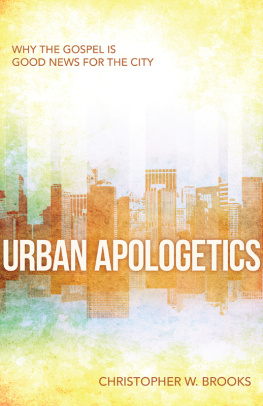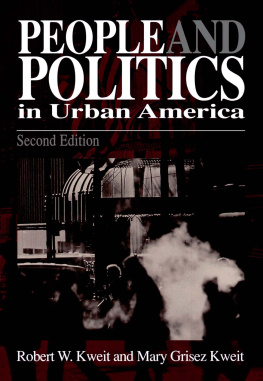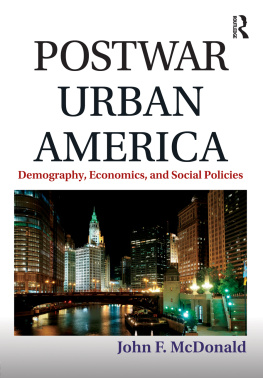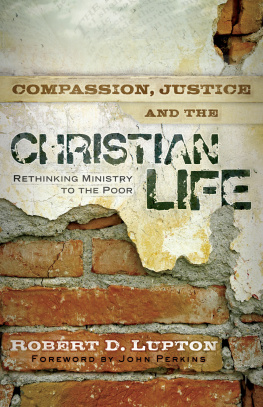To Peggy, my wife and partner on this journey, whose compassion inspires me and whose integrity keeps me out of trouble.
T he year was 1971 and I was a young husband and father, just returned from the crossfire of Vietnam. I was convinced God had called me to minister to the poor in the inner city of Atlanta, but nothing in my semirural, midwestern background had prepared me for urban life.
My wife and I saw the city as a mission field and ourselves as missionaries carrying the light of the gospel into the darkness of the ghetto. How surprised we were when we discovered that the One who had called us already preceded us. Those to whom we came to share our faith frequently had more faith than we did. They had learned to depend on God for their daily bread, and answers to their prayers were often miraculous. Their capacity to care sacrificially for neighbors and family members made our scheduled, metered acts of service sometimes seem trite and even self-serving.
So it was that Gods children who suffer most from crushing poverty became the very ones God used to speak to us of our own spiritual poverty. From those who had very few material possessions, we learned about our bondage to things. And from those who had much to fear and little to hope, we learned courage and faith.
The following reflections are glimpses into our eighteen-year journey on the streets of the city. Around every corner is the unexpected. Values collide. Beliefs are challenged. Emotions soar and fall. The city, I have concluded, is a dangerous place to walk, especially for those of us who carry valuable baggage. Much of what we hold dear is likely to be stripped away. But for every loss there is a gain; something of greater value is given. That is part of the wealth of the inner city, and that is why we have made the city our home.
Robert D. Lupton
L ook at them, walking down the middle of the road, we said. Young toughs. They act like they own the street.
It looked like an act of defiance to my wife, Peggy, and me. It was one of those things newcomers notice immediately in a strange culture. We had moved into the city to work and make our home, and it was clear that overcoming our anxieties was our first challenge. We decided to take evening walks, a different direction each night, until we were familiar with our new surroundings.
Unexpected things happen when you walk down city sidewalks at night. Things for which one could hardly prepare. Things that the shadows conceal. Like a dog that lies in wait and then ferociously attacks the fence that only he knows separates you. And there are sections of sidewalk, broken and jutting, with which time and tree roots have had their way. They too lie in wait to trip the one whose mind is more on talking than walking.
Maybe the most unexpected thing of all was that we were not afraid. Not for the most part. Scary strangers soon became familiar faces. Staggering drunks became friends for whom we learned compassion. Young people, sometimes high on drugs, became individuals with names and families and special needs. Even those who were most elusive behind their locks and barsthe elderlybegan to wave and respond to our Good evening.
Of course there were the real and ever-present dangers. An occasional sociopath, the deeply troubled person who preyed on the unsuspecting and struck fear in the hearts of the entire community. Broken glass poised and ready to puncture the next thin-soled shoe to happen by. And tall weeds that reached out to scratch and cling. But for the most part we discovered that the real enemies of the street were alienation, misunderstanding, prejudicethose attitudes out of which most of our ill-founded fears sprouted.
More than seven years have passed since Peggy and I moved into the city. We still take our evening walks. Its our best time for talking and catching up on the busy activities of the day. Its a good time to confront the enemies of the street by remembering peoples names and the little, important happenings of their lives.
And the unexpected dangers that lurk in the darkness? Weve learned to elude most of them by walking in the street rather than the sidewalk.
Someday a newcomer to our neighborhood will remark, Look at them, walking down the middle of the road. They act like they own the street!
T here is a saint who lives in our neighborhood. I call her the Mother Teresa of Grant Park. She has been an inner-city missionary for nearly thirty years. She has no program, no facility, and no staff. She lives in virtual poverty. Her house blends well with the poor who are her neighbors. There are box springs and mattresses on the porch and grass growing up around the old cars in her front yard.
She goes about feeding and clothing the poor with donations from concerned people. She works all hours of the day and night. She is difficult to reach by phone, and she doesnt give tax deductible receipts to her donors. To the consternation of her mission board, she seldom submits ministry reports (although for years she has faithfully saved all her receiptsin a large trash bag in her living room).
The Mother Teresa of Grant Park appears to have a poorly ordered life. She doesnt plan ahead much. She says she needs to stay free to respond to the impulse of Gods Spirit. And that she does. Through her, God works quiet miracles day after day.
I, on the other hand, love order. I am of a people who love order. I was taught long ago to appreciate a neatly made bed and a well-trimmed yard. I am passing this value on to my children. We eat our meals together when everyone is seated and after the blessing is said. A calendar attached to our refrigerator door helps us organize our family activities. Order is a fundamental goal of our household.
Order is also a fundamental tool of achievers. It enables us to control our time, our money, our efficiency. We can arrange our thoughts, build computers, and soar to the moon. If a task of humanity is to subdue the earth, then doubtless we achievers will provide the leadership. We are quite sure that God is a God of order. Our worship style and systematic theologies are clear reflections of that.
To the poor, order is a lesser value. Most pay little attention to being on time, budgeting money, or planning ahead. They may spend their last dollar on a Coke and a bag of chips to fill them up for three hours instead of buying rice or beans to last for three days. A mother may keep her children out of school to babysit so she can see the familys caseworkertrading the future for the present. A family seems not to mind tall grass, old tires, and Coke cans in the yard. Mealtime is whenever people get home. They seem to react rather than to prepare. Often their faith in God appears simple, emotional, even illogical. God helps you when youre in trouble and whups you when youre bad. Hes good and does a lot of miracles.
Perhaps it cannot be otherwise when survival dominates a peoples thinking. But something disquiets me when I reflect on these poor neighbors of mine and the Mother Teresa of Grant Park. Their disorderly lifestyles keep them from going anywhere, from achieving, from asserting control over their futures. Unless they change, they will never be upwardly mobile and self-sufficient. They will never be able to create successful organizations nor enjoy the finer things of life. They will remain dependent, simple, poor.
Now heres what bothers me. Why would Christ say, Blessed are the poor, for theirs












